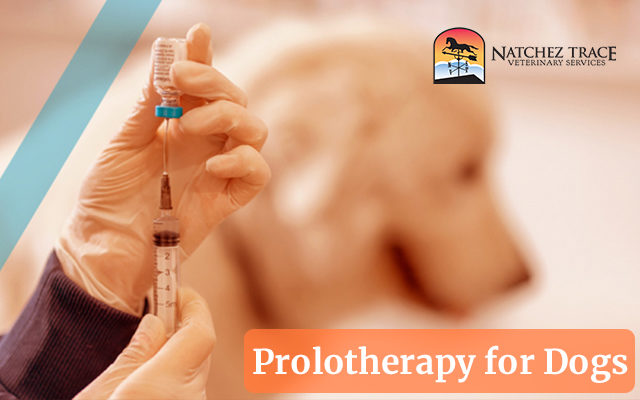Exploring Dog Prolotherapy
At our clinic, we understand the profound connection you share with your furry friend, and their health is our top priority.
Join us on a journey of discovery as we delve into the world of dog prolotherapy – a non-surgical marvel designed to relieve your pet’s chronic pain and elevate their overall quality of life.
What Sets Dog Prolotherapy Apart?
Dog prolotherapy, or nonsurgical ligament reconstruction, is a medical treatment for chronic pain.
In the heart of dog prolotherapy is the concept of “prolo,” which is short for proliferation.
This cutting-edge treatment stimulates the growth of new connective tissue where weakness persists.
Developed initially for human joint pain, clinical prolotherapy trials have shown a remarkable 30-40% increase in joint ligament strength.
Clinical results using cat and dog prolotherapy appear to indicate the same response.
In fact, many elite human athletes use prolotherapy to strengthen weak tissues to prevent future injury.
Prolotherapy targets weakened tendons and ligaments essential for joint stability and movement.
The mechanism of prolotherapy is simple. By injecting a mild irritant solution, the “proliferant,” into these areas, we kickstart a localized inflammation, activating the healing process and fostering the growth of robust and healthy ligament and tendon tissue.
The pain naturally resolves as the tendons and ligaments grow stronger and more capable of supporting and maintaining normal joint stability.
Dog Prolotherapy’s Reach
Below is a detailed exploration of the diverse range of chronic musculoskeletal pains that dog prolotherapy effectively addresses:
- Arthritis:
- Before: Stiffness, discomfort, and reduced mobility.
- After: Increased joint flexibility, improved mobility, and a renewed zest for life.
- Degenerative Joint Disease:
- Before: Gradual deterioration of joint function and increased pain.
- After: Slowed disease progression, enhanced joint function, and pain alleviation.
- Torn Ligaments and Tendons:
- Before: Instability, lameness, and limited range of motion.
- After: Strengthened ligaments and tendons, restored stability, and improved movement.
- Cartilage Injuries:
- Before: Cartilage damage leading to discomfort and joint dysfunction.
- After: Regenerated cartilage, reduced pain, and improved joint function.
- Tendonitis:
- Before: Inflammation, pain, and limited tendon function.
- After: Reduced inflammation, pain relief, and restored tendon functionality.
- Back and Neck Pain:
- Before: Chronic pain, stiffness, and reduced activity.
- After: Alleviated pain, increased flexibility, and enhanced quality of life.
- Partially Degenerated or Herniated Vertebral Disks:
- Before: Spinal disk issues causing pain and discomfort.
- After: Improved disk health, pain resolution, and restored spinal function
Prolotherapy is not always a substitute for surgery, as not all animals are candidates for this type of medical procedure.
Each case is evaluated on an individual basis!
Ideal Candidates for Dog Prolotherapy
As mentioned above, prolotherapy is not always a substitute for surgery
Discover if your dog is a candidate for prolotherapy:
- Chronic Osteoarthritic Pain:
- Suitable for animals experiencing chronic osteoarthritic pain in one or more joints.
- Benefits: Relief from pain, improved joint function, and enhanced mobility.
- Geriatric Animals:
- Tailored for geriatric animals with chronic arthritis or joint pain, especially those with poor anesthesia candidates.
- Benefits: Alleviation of pain, improved comfort, and enhanced quality of life.
- Anterior Cruciate Ligament (ACL) Injuries:
- Ideal for animals with injuries or partial tears of one or both anterior cruciate ligaments. Prolotherapy is a better choice than surgery for many dogs.
- Benefits: Strengthening of ligaments, restored stability, and improved movement.
- Performance Animals (Agility, Working Dogs):
- Specifically designed for performance animals dealing with ligament or tendon injuries.
- Benefits: Swift recovery, restored agility, and enhanced performance.
- Sensitivity to Conventional Pain Medications:
- Suited for animals sensitive or reactive to conventional pain medications like Rimadyl or Dermaxx.
- Benefits: Alternative pain relief, customized to your dog’s unique sensitivities.
Our clinic proudly offers dog prolotherapy as a beacon of hope for pets experiencing chronic pain.
Prolotherapy seamlessly combines advanced medical practices with a personalized touch, ensuring your dog receives the care he or she deserves.
Interested in prolotherapy for your dog? Contact us today!





